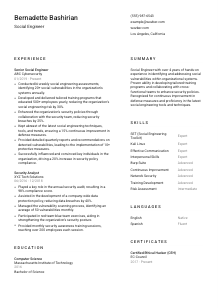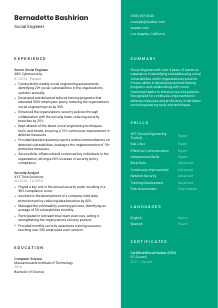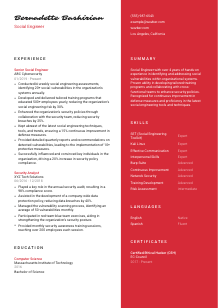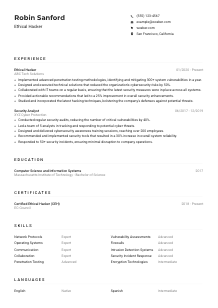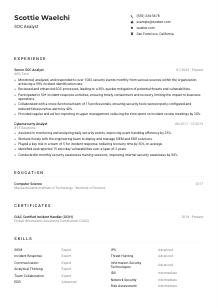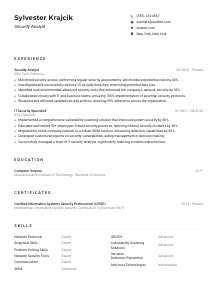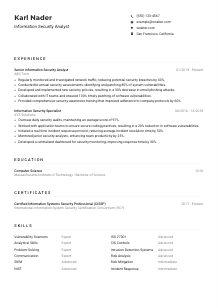Social Engineer CV Example
Manipulating minds, but your CV isn't mind-blowing? Delve into this Social Engineer CV example, shaped with Wozber free CV builder. Grasp how to tailor your social engineering prowess to job cues, crafting a career narrative that opens doors and minds!
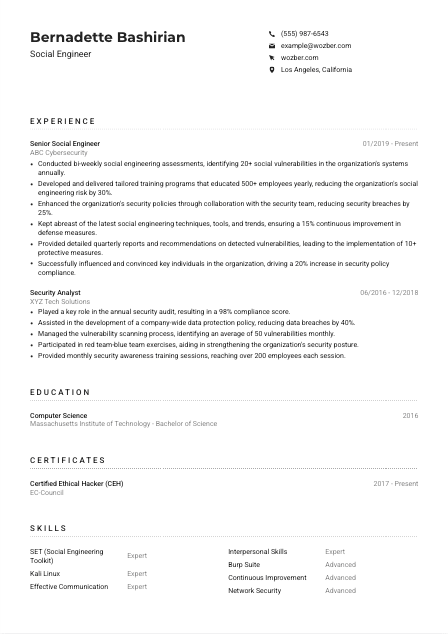
How to write a Social Engineer CV?
Hello there, aspiring Social Engineer! In the realm of cyber-security, where each detail can be a game-changer, your CV is not just a document; it's your ultimate key to unlocking doors of opportunities. With the guidance of Wozber, your journey in tailoring a CV that resonates with the job description of a Social Engineer begins.
By aligning your CV with the job's intricacies and otimizing it for Applicant Tracking Systems (ATS) using Wozber's free CV builder and ATS CV scanner, you set the stage for success. Let's dive into how to tailor your cyber savvy into a compelling narrative that not only passes the ATS test with flying colors but also engages hiring managers.
Personal Details
Let's kick things off with your personal details, the unsung hero of your CV. For a Social Engineer, this section is not just about contact info; it's about setting a sharp, professional tone that aligns with the cyber-security domain.
1. Spotlight Your Name
Your name isn't just a label; it's your brand. Make it stand out by using a clear, professional font. Consider using a slightly larger font size for your name to ensure it grabs attention at the first glance.
2. Job Title Precision
Directly beneath your name, crisply state your professional identity. For instance, 'Social Engineer' as it directly mirrors the job title you're aiming for. This instant alignment helps hiring managers see you in the role from the get-go.
3. Contact Info Count
Ensure your contact information is streamlined and consists of your most accessible phone number and a professional email address. A format like firstname.lastname@email.com projects professionalism.
4. Location Matters
Given that the job specifies 'Must be located in Los Angeles, California,' highlighting your Los Angeles residence upfront checks a vital box, reassuring employers about your logistical fit.
5. Digital Footprint
In the digital era, especially for a Social Engineer, your online presence speaks volumes. Including a link to your LinkedIn profile or a personal website can demonstrate your engagement with the cyber-security community.
Takeaway
Consider the Personal Details section as your CV's robust handshake. It's your first opportunity to introduce yourself in a professional, concise, and job-aligned manner. Think of it as laying down a red carpet for your professional narrative. Tidy, precise, and tailored to your role as a Social Engineer, it's where you begin to make your mark.





Experience
The Experience section is where you can truly shine as a Social Engineer, demonstrating your skill in navigating the complex landscape of cyber-security. Let's delve into how to craft this section in a way that showcases your strategic acumen and technical prowess.
- Conducted bi‑weekly social engineering assessments, identifying 20+ social vulnerabilities in the organisation's systems annually.
- Developed and delivered tailored training programs that educated 500+ employees yearly, reducing the organisation's social engineering risk by 30%.
- Enhanced the organisation's security policies through collaboration with the security team, reducing security breaches by 25%.
- Kept abreast of the latest social engineering techniques, tools, and trends, ensuring a 15% continuous improvement in defense measures.
- Provided detailed quarterly reports and recommendations on detected vulnerabilities, leading to the implementation of 10+ protective measures.
- Successfully influenced and convinced key individuals in the organisation, driving a 20% increase in security policy compliance.
- Played a key role in the annual security audit, resulting in a 98% compliance score.
- Assisted in the development of a company‑wide data protection policy, reducing data breaches by 40%.
- Managed the vulnerability scanning process, identifying an average of 50 vulnerabilities monthly.
- Participated in red team‑blue team exercises, aiding in strengthening the organisation's security posture.
- Provided monthly security awareness training sessions, reaching over 200 employees each session.
1. Job Description Breakdown
Start by dissecting the job description. Highlight requirements like 'Conduct regular social engineering assessments' and map them against your achievements. This ensures you're speaking the hiring manager's language right off the bat.
2. Present Roles Strategically
Chronologically arrange your roles, starting from the most recent. Each entry should concisely include your job title, the company's name, and the period you were employed, painting a clear timeline of your professional journey.
3. Achievement-Focused Statements
Each role you list should pivot around achievements that resonate with the job requirements. Phrases like 'Identified 20+ social vulnerabilities annually' directly echo the job's call for someone who can 'identify social vulnerabilities within the organisation's systems.'
4. The Power of Quantification
Quantifying your accomplishments provides a tangible measure of your impact. For a Social Engineer, illustrating how your initiatives reduced risk or enhanced training efficiency by certain percentages can be particularly compelling.
5. Relevance is Key
In the realm of Social Engineering, not all experience is created equal. Prioritize showcasing responsibilities and achievements that align with the skills and duties outlined in the job description, ensuring each point underscores your suitability for the role.
Takeaway
Consider each bullet in the Experience section as a testament to your capabilities as a Social Engineer. Tailor it strategically to highlight your achievements, aligning them with the job's requirements. This is where you demonstrate not just your qualifications but your excellence for the role. Showcase your impact, backed by evidence, and watch as doors open to new opportunities.
Education
The Education section, while seemingly straightforward, is a critical pillar supporting your candidacy as a Social Engineer. It's where you reflect the academic bedrock upon which your skills and expertise are built.
1. Highlight Required Degree
Your bachelor's degree in Computer Science, Information Technology, or a related field is a must-mention, aligning perfectly with the job's educational prerequisites. Listing it verifies that your academic background matches the foundational requirements.
2. Simple yet Specific Formatting
Maintain a clear structure by listing your degree, field of study, the institution, and your graduation year. This straightforward format ensures the hiring manager can quickly verify your educational credentials.
3. Degree Detailing
If your degree directly corresponds with the job requirement—like 'Bachelor of Science in Computer Science'—make sure it's clearly stated. This direct alignment can set you apart in a field that values specific technical backgrounds.
4. Coursework and Specializations
Though our example doesn't delve into specific courses, mentioning relevant coursework or specializations can be a huge advantage, especially if they directly relate to skills or knowledge areas mentioned in the job description.
5. Supplementary Educational Achievements
Any additional academic recognitions or relevant project work should be succinctly included. For senior roles, this might be less critical, but it can still provide depth to your educational narrative, emphasizing a continuous commitment to your field.
Takeaway
The Education section is your platform to showcase the academic prowess behind your professional expertise. It's an opportunity to highlight not just where you've been, but how prepared you are for the role of a Social Engineer. Let it reflect the strength of your educational background and its relevance to your career aspirations.
Certificates
In a field as dynamic as social engineering, certifications can significantly bolster your profile. They're proof of your dedication to continuous learning and your prowess in specialized areas. Let's navigate how to feature them effectively.
1. Identify Pertinent Certifications
Though the job description may not explicitly demand certifications, showcasing relevant ones like 'Certified Ethical Hacker (CEH)' directly underscores your expertise and commitment to the field.
2. Align Certificates with Job Necessities
Opt to list certifications that resonate with the job's demands and the broader field of cyber-security. Prioritize those that reflect skills or knowledge directly relevant to a Social Engineer's role, ensuring you present a perfectly fitted candidate profile.
3. Dates Show Current Knowledge
Include the acquisition or validity dates of your certifications. This provides insight into the currency of your skills and knowledge, an especially crucial aspect in the fast-evolving tech landscape.
4. Pursue Ongoing Learning
The cyber-security domain is ever-changing, necessitating continuous education. Regularly updating your certifications and pursuing new ones aligned with your career goals portrays you as a proactive and dedicated professional.
Takeaway
Certificates are more than accolades; they are tangible representations of your expertise and dedication to staying at the pinnacle of your profession. For a Social Engineer, they corroborate your skill set, making you a compelling candidate. Integrate them into your CV with precision, demonstrating your commitment to excellence and continuous learning.
Skills
In the cyber battleground, a Social Engineer's skills are their armory. How you present them in your CV can be the difference between blending in and standing out. Dive into how to curate a skills section that highlights your technical adeptness and strategic insight.
1. Map Skills from Job Description
Extract and list skills directly from the job description that matches your capabilities. It demonstrates your alignment with the role's requirements, showcasing proficiency in areas like 'SET (Social Engineering Toolkit)' and 'Kali Linux', which are crucial for a Social Engineer.
2. Balance Hard and Soft Skills
While technical skills are your bread and butter, don't underestimate the power of soft skills. Effective communication and interpersonal abilities are key for a Social Engineer, as influencing and convincing others is part of the core role.
3. Curate with Precision
Resist the temptation to list every skill you own. Focus on those most pertinent and impressive to a hiring manager. A well-chosen array of skills that perfectly aligns with the job description makes your CV both compelling and concise.
Takeaway
The Skills section is where you get to shine a spotlight on the arsenal that positions you as the perfect candidate for a Social Engineer role. Curated carefully, it tells hiring managers you're not just a fit for the job—you're a standout. Leverage your skills strategically, ensuring they align with what the role demands and what the cyber-security landscape values.
Languages
In the interconnected world of cyber-security, the ability to communicate effectively across cultural boundaries is invaluable. Here's how to make your linguistic capabilities work in your favor, especially for a role that demands clear expression and understanding.
1. Match Job Language Requirements
The job specification emphasizes the importance of clear expression in English. Make sure to highlight your proficiency in English, labeling it as 'Native' or 'Fluent' as appropriate, to meet this essential requirement.
2. Showcase Additional Languages
Any additional languages you speak can set you apart, especially in roles that may involve international collaboration or understanding diverse psychological profiles. Label your proficiency levels accurately: Native, Fluent, Intermediate, or Basic.
3. Be Honest About Proficiency
Clarity about your language skills prevents misunderstandings and sets clear expectations. Honesty about your proficiency level can go a long way in establishing trust with potential employers.
4. Languages as Cultural Bridges
For a Social Engineer, understanding the nuances of communication in different languages can enhance your ability to influence and understand various social dynamics. It's an underrated skill that can give you an edge.
5. Understand Role-specific Needs
While the specific job may not demand multilingual skills, showcasing your language proficiency can indicate your ability to communicate effectively in diverse environments, a plus in the globalized world of cyber-security.
Takeaway
Language skills on your CV speak volumes about your ability to communicate, connect, and understand a broad spectrum of cultures and personalities. For a Social Engineer, this ability can be a differentiating factor, highlighting your readiness for the role's demands. Flaunt your linguistic skills with pride, and let them underscore your versatility and global mindset.
Summary
The Summary section of your CV is your moment to encapsulate your professional journey and aspirations succinctly. It's your chance to make a persuasive first impression, drawing in hiring managers with a compelling narrative.
1. Digesting the Job Description
Kick off by deeply understanding the role you're applying for. Grasp the essence of the job requirements, and let them guide the tone and content of your summary.
2. Profession and Experience Snapshot
Begin with an overarching statement about your professional identity and the wealth of experience you bring. For a Social Engineer, highlighting your hands-on experience in identifying and addressing social vulnerabilities sets a solid foundation.
3. Key Skills and Achievements
Pinpoint a few of your standout skills and noteworthy achievements that align with the job's requirements. Illustrate your unique impact in the field, underlining how your efforts have fortified organisational security.
4. Conciseness Is Key
While your career narrative might be rich, the Summary needs to be a distilled essence. Aim for 3-5 lines that powerfully convey your professional identity and readiness for the role, inviting the reader to dive deeper into your CV.
Takeaway
Consider the Summary as your elevator pitch - concise yet comprehensive, it's your chance to communicate your fit for the Social Engineer role clearly and compellingly. It's the opening note of your professional symphony, meant to intrigue and assure hiring managers that they're about to discover an ideal candidate. Craft it with care, and let it set the tone for your success.
Embarking on Your Social Engineer Voyage
As we wrap up this guide, equipped with insights and strategies, you're now ready to craft a Social Engineer CV that resonates with what hiring managers are looking for. Your CV is a powerful tool that narrates your professional journey and expertise. By fine-tuning each section with the guidance of Wozber's free CV builder, utilizing ATS-friendly CV templates, and ensuring ATS optimisation with the ATS CV scanner, you can create a document that not only passes the ATS filter but captivates the human eye. The path to your next big role as a Social Engineer is clear.
Let your CV be the key that unlocks new opportunities. The cyber-security domain awaits your contributions. Go forth, innovate, and secure your position in the digital world!

- Bachelor's degree in Computer Science, Information Technology, or a related field.
- Minimum of 3 years of experience in social engineering or related security fields.
- Proficiency in tools like SET (Social Engineering Toolkit), Burp Suite, and Kali Linux.
- Strong understanding of human psychology and social dynamics.
- Effective communication and interpersonal skills to influence and convince individuals at all levels.
- Must be able to express ideas clearly in English.
- Must be located in Los Angeles, California.
- Conduct regular social engineering assessments to identify social vulnerabilities within the organization's systems.
- Develop and deliver tailored training programs to educate employees on social engineering risks and prevention measures.
- Collaborate with the organization's security team to enhance security policies and awareness campaigns.
- Stay updated on the latest social engineering techniques, tools, and trends to ensure continuous improvement in defense measures.
- Provide detailed reports and recommendations on detected vulnerabilities and protective measures to the management team.





